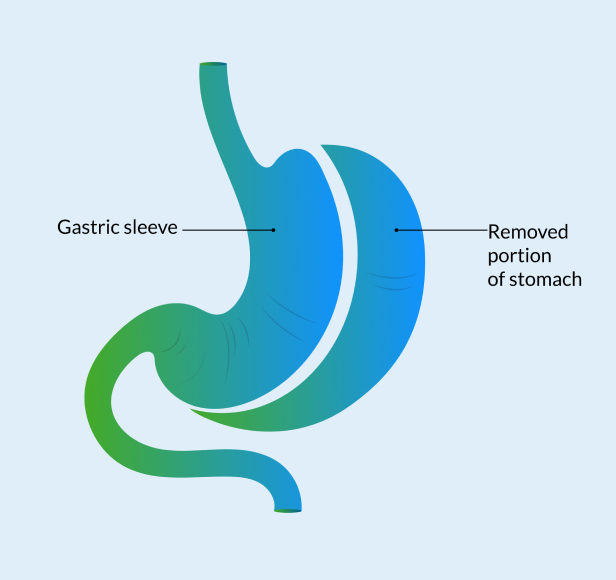Your Guide to
Gastric Sleeve Surgery
Embarking on a weight loss journey can be daunting, but with Gastric Sleeve Surgery, achieving your health goals is within reach. This procedure offers a significant step towards a healthier lifestyle for those who have struggled with obesity and its associated health risks. Our dedicated team is here to guide you through every step, from initial consultation to post-operative care, ensuring a supportive path to your new beginning.
What is Gastric Sleeve Surgery?
Gastric sleeve surgery, also known as sleeve gastrectomy, is a surgical weight-loss procedure in which a large portion of the stomach is removed, leaving a smaller, banana-shaped “sleeve” or pouch.
This surgery is typically performed laparoscopically, using small incisions in the abdomen. A portion of the stomach is removed thereby limiting food intake and sensation of hunger. The procedure does not involve intestinal rerouting or malabsorption and there is no foreign material left within the abdomen.

How It Works
How the Gastric Sleeve Procedure Works
During the procedure which generally lasts 40-60 minutes, the surgeon removes approximately 80% of the stomach, including the part that produces the hunger-stimulating hormone ghrelin. By reducing the size of the stomach, gastric sleeve surgery restricts the amount of food that can be eaten at one time, leading to decreased calorie intake and weight loss. The majority of patients are discharged from the surgery center or hospital the following morning and are able to return to work in 1.5-2 weeks.
Oregon Weight Loss Surgery offers lifelong follow up to ensure our patients success!
Am I A Candidate for Gastric
Sleeve Surgery?
Gastric sleeve surgery is often recommended for individuals with a BMI of 35 or above, who have not been successful with other weight-loss methods such as diet and exercise, or for those with BMI of 30 or above with obesity-related health problems such as type 2 diabetes, high blood pressure, or sleep apnea. It is considered a relatively safe and effective option for weight loss, and it requires significant lifestyle changes, vitamin supplementation and ongoing medical follow-up including lab surveillance to achieve and maintain successful weight loss outcomes.
Unlike the gastric bypass procedure, the gastric sleeve does not disrupt the intestines.


Benefits of Gastric Sleeve Surgery
Gastric Sleeve Surgery offers numerous benefits:
- Significant weight loss: Most patients lose 60-70% of their excess body weight within the 12-18 months following surgery.
- Improved health conditions: Conditions such as diabetes, high blood pressure, heart disease, PCOS, infertility, insulin resistance and sleep apnea often improve or resolve completely.
- Enhanced quality of life: With weight loss, many find a boost in confidence, mobility, and an overall improvement in lifestyle.
Take the Next Step Towards a Healthier Life
Schedule Your Consultation Today!
Ready to transform your life? Schedule a consultation with our experts today. This no-obligation meeting is your first step towards a healthier, happier you
Why Choose Oregon Weight Loss Sugery for Your Gastric Sleeve Surgery?
Our team of specialists brings together years of experience, a compassionate approach, and a commitment to personalized care. We’re here to support you before, during, and after your surgery, ensuring you have the tools and support needed for a successful journey. Discover why we’re the right choice for your gastric sleeve surgery.

Frequently Asked Questions
Answers to all your Oregon Weight Loss Surgery questions and more. If you haven’t found what you’re looking for, please contact us at the link below.
What is the process to get gastric sleeve surgery?
The best first step for bariatric surgery is to schedule a consultation with our office. During the consultation, we will review your medical history and medications, and provide details of the best option for your specific goals.
How does gastric sleeve surgery differ from other weight loss surgeries like gastric bypass or gastric banding?
Unlike gastric bypass, which involves rerouting the digestive system, or gastric banding, which involves placing a band around the stomach to create a smaller pouch, gastric sleeve surgery involves removing a portion of the stomach. This surgery primarily works by reducing the stomach's size and appetite-regulating hormones, leading to weight loss.
Are there any dietary or lifestyle changes I'll need to make before and after the surgery?
Yes, before surgery, patients typically undergo a pre-operative diet to shrink the liver and reduce surgical risks. After surgery, dietary changes involve transitioning from liquid to soft foods and eventually to solid foods over several weeks. Long-term dietary modifications include eating smaller, more frequent meals, avoiding high-calorie and high-sugar foods, and prioritizing protein-rich foods. Regular physical activity and behavior modifications are also essential for successful weight loss and weight maintenance.
Does insurance cover gastric sleeve surgery?
Whether insurance covers gastric sleeve surgery can vary depending on several factors, including your insurance provider, specific policy, and individual circumstances. In many cases, insurance may cover gastric sleeve surgery if it is deemed medically necessary and meets certain criteria established by the insurance company.
Do you have a self-pay program for gastric sleeve?
Yes, we have a comprehensive program for self-pay patients that includes all fees and follow up visits plus our Enhanced Care Package. To inquire about the cost, please contact our office.
© 2026 Oregon Weight Loss Surgery. All Rights Reserved. Powered by Engage 365 Media